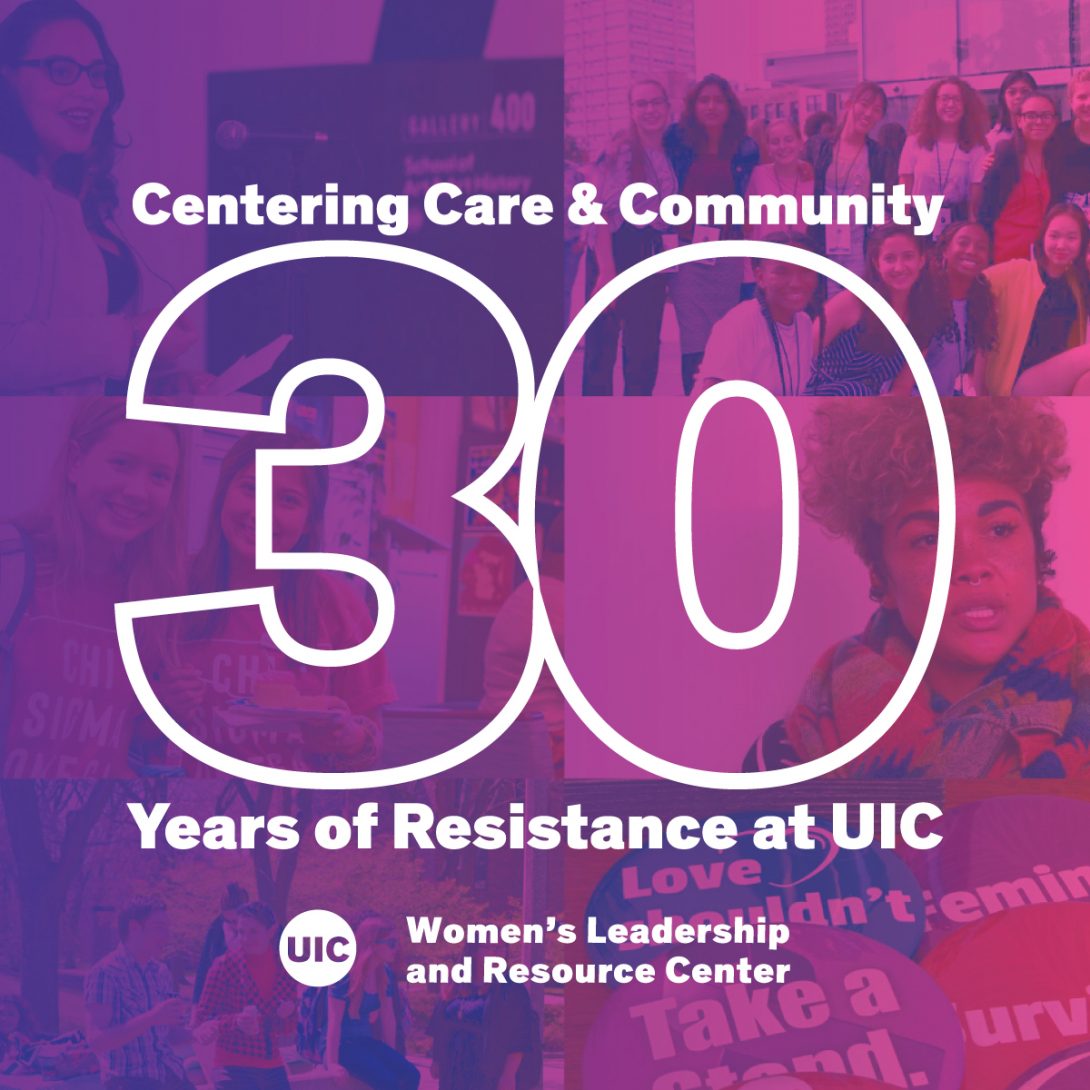WLRC at 30
WLRC at 30 Heading link

This week, WLRC launches its 30th anniversary celebration with the event “Sustaining Centers of Care, Community, and Resistance,” a roundtable conversation among feminist leaders of women’s and gender equity centers around the state of Illinois. This event is the first of several taking place in spring 2021 and fall 2021. Each event will expand on an aspect of the anniversary theme “Centering Care and Community: 30 Years of Resistance at UIC.”
The theme emerged from multiple discussions among the 30th anniversary planning committee. The committee includes WLRC and CAN’s program staff including graduate students (Jazmin Vega, Seth Quam); faculty member Em Rabelais (College of Nursing); UIC alumni (Meghna Bhat, Emoonah McClerklin); staff (Rachel Caidor, Anna Sandoval), and current students (Rashida Thompson, Julianna Willson). We asked several questions, including what stories did we need to tell about the center: beyond saying it emerged from student activism, how did it come to be; what has it been for faculty, staff, and various groups of students who have interacted with its programs and services; how has the center changed or shifted over time; what still needs to change; how we would tell those stories; what are our own relationships to women’s centers and feminisms. The concepts of care, community, and resistance emerged emphatically. It’s not hard to see why these terms resonated with us. One of the main ways that WLRC has been known on campus is through the advocacy and education work of its largest program, the Campus Advocacy Network (CAN). CAN embodies these concepts in particular ways, though; the goal of the year-long celebration will be to show the myriad ways that these terms take form and are given life in WLRC’s programs, partnerships, and strategies of public engagement.
These terms are also understood and practiced by minoritized groups on college campuses in the U.S. as theories and methods for asserting belonging. They go to the heart of exposing the role of educational institutions in perpetuating systems of inequality and exclusion that exist in the larger society. They also evoke survival, agency, talking back, collective identity, and intentional action to change the institutional context in which they exist. Cultural centers, including those at UIC, know this well. They have to respond to the larger political climate in the society, the distinct needs of the groups that they center in their unit’s identity, and the recurring questions on the campus about why they exist in the first place.
Similarly, campus-based women’s centers (now called women’s and gender equity centers to reflect the actual work that they do)–whether they operate from closet-sized offices in the basement or free-standing buildings of their own–exist to push back against the notion that 1) universities are inherently safe spaces for everyone who attends; 2) knowledge created and shared within the university fairly represents the perspectives of its members who belong to marginalized groups; and 3) the university always changes for the better and to the benefit of all.
For as long as they have existed – some say since the 1940s, other accounts mark 1960 at the University of Minnesota – women’s and gender equity centers (WGEC) in the U.S. have remained a critical site for feminist and social justice education, intellectual work, and making visible social inequities (based on gender, race, economic status, disability, family status) that limit and exclude many women from getting a college education. As the institutional diversity of the roundtable suggests, WGECs are as varied as where they are located. They exist at community colleges around the country and historically Black universities in southern states, and urban universities serving majority people of color, not just at the historically white universities in the northeast and midwest. Some come through faculty demands and student-driven initiatives, others negotiated over time, still others declared by administrative fiat. Some reproduce exclusionary forms of feminism that center white, middle-class, Christian, and cisgender identities; others see inclusion and solidarity as essential to the feminist praxis and align themselves and their programming closely with a variety of social justice movements inside and outside the U.S. And depending on who is telling the story, women of color, transgender women, gender nonconforming persons, and women who parent and work to send themselves to school, move between the foreground and background.
As the March 30 roundtable will share the stories of other centers in the state, we are also thinking of how do we tell WLRC’s story? Perhaps we need to tell multiple stories.
Since summer 2020, and through the painstaking efforts of Meghan Daniel, doctoral student in Sociology at UIC and longtime participant in WLRC’s programs, we have been moving in the right direction of delineating the organization’s history, identifying the individuals who have been key players, mapping key moments, and putting the center into conversation with the larger political events and debates over the past 30 years. We hope to finish this project in the fall of 2021, but we will need your help to do so. If you have flyers, documents, communication, names of students, staff, etc. who participated in its signature programs (e.g., Women’s Leadership Symposium) or were involved with WLRC in a collaborative fashion, please share them with us.
Join us for the next 30th anniversary event on Friday, April 9! Come hear UIC graduate students, both past and present, reflect on working in and learning from WLRC. The panel will be moderated by UIC alumna Meghna Bhat, who is also a member of the planning committee. We hope to see you there!
Take care of yourselves and your communities,
Natalie Bennett
Director, WLRC and CAN